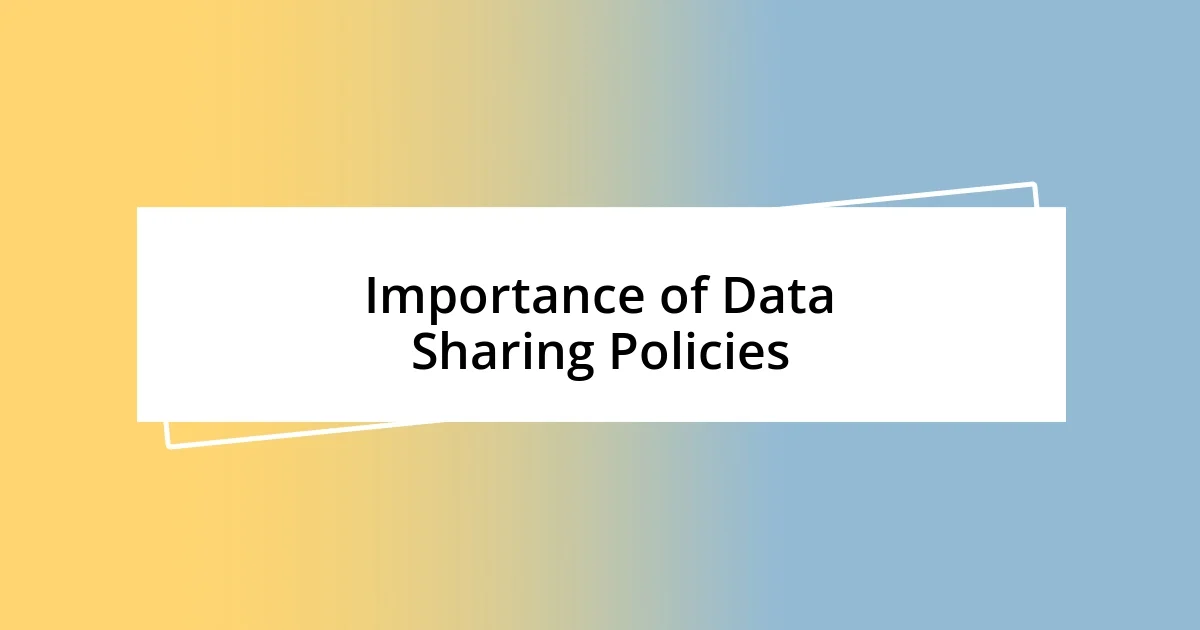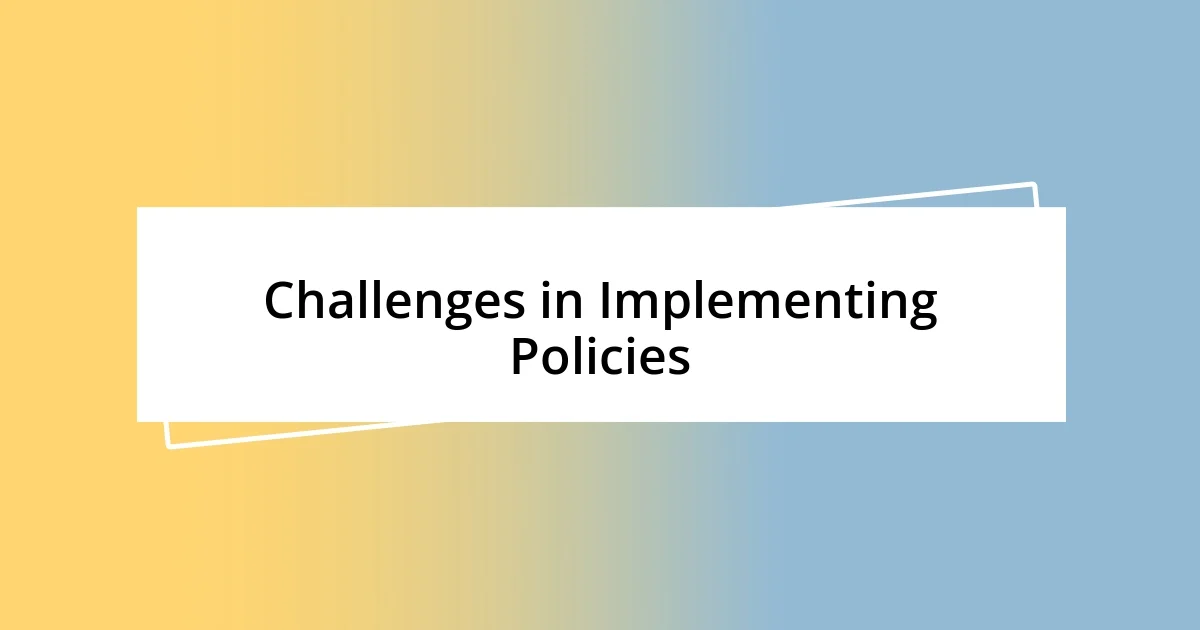Key takeaways:
- Data sharing policies are essential for balancing transparency and privacy, fostering consumer trust while adhering to legal standards.
- Effective policies should be clear, concise, and regularly updated, encompassing defined terms, usage guidelines, security measures, compliance, and review processes.
- Successful policy adoption requires stakeholder engagement, proper training, and transparency about benefits to enhance acceptance and collaboration.

Understanding Data Sharing Policies
Data sharing policies are crucial in defining how organizations use and distribute data. I remember when I first encountered one at a previous job; it felt overwhelming. But as I delved deeper, I found that these policies provide essential guidelines, much like a map, helping me navigate the often murky waters of data ethics and compliance.
What struck me most was the balance between transparency and privacy. I often wondered, how do companies ensure that the information shared doesn’t breach trust with consumers? For instance, I worked on a project where we needed to share customer data with a partner for a marketing campaign, and it required meticulous review of both parties’ policies. The detailed explanations in our data sharing agreements opened my eyes to the importance of maintaining consumer trust while still leveraging data for beneficial purposes.
Moreover, the flexibility these policies offer can be both empowering and daunting. I’ve seen situations where a clear data sharing policy led to innovative collaborations, but it also made me realize the potential risks involved. It’s a delicate dance, and I often ask myself: are we ready to embrace the opportunities that come from sharing data, while fully understanding the implications it carries? It’s a question worth reflecting on for anyone involved in data-driven decisions.

Importance of Data Sharing Policies
The importance of data sharing policies cannot be overstated—they serve as a backbone for responsible data management. In my experience, I’ve found that a well-structured policy fosters trust between organizations and their customers. For instance, when my team rolled out a new product, having a clear data sharing policy ensured our customers felt secure, knowing exactly how their information was being handled. It’s this transparency that can differentiate a company in a crowded market.
Additionally, data sharing policies are pivotal for ensuring compliance with legal standards. I recall a time when our startup faced potential legal repercussions simply due to unclear data-sharing guidelines. The anxiety was palpable as we scrambled to align with GDPR regulations. Once we established a robust policy, not only did it alleviate our legal concerns, but it also gave us the confidence to pursue partnerships we’d previously hesitated to explore.
Moreover, these policies can be transformative, paving the way for innovation and collaboration. I vividly remember launching a collaborative project between our company and a tech partner, which thrived on shared insights. The clarity and guidelines outlined in our data sharing policy were instrumental—it took what could have been a chaotic process and turned it into a streamlined operation, showcasing the value of collective expertise.
| Aspect | Importance |
|---|---|
| Trust | Builds consumer confidence |
| Compliance | Ensures adherence to regulations |
| Innovation | Facilitates collaboration and creativity |

Key Components of Effective Policies
One of the hallmark features of effective data sharing policies is their clarity. In my experience, when a policy is concise and straightforward, it minimizes confusion. For example, I once stumbled upon a lengthy document filled with jargon that left me scratching my head. Conversely, a succinct policy I later worked with had carefully defined terms and conditions, which made it easy to grasp the fundamental principles underlying data sharing. This clarity empowered our team and allowed us to act decisively while making critical data-driven decisions.
When creating a data sharing policy, several key components should never be overlooked:
- Clear Definitions: Ensure all terms are clearly defined to avoid ambiguity.
- Data Usage Guidelines: Specify how data can be used and for what purposes.
- Security Measures: Outline the security protocols in place to protect the data.
- Compliance Information: Provide details on how the policy aligns with applicable laws and regulations.
- Review and Update Procedures: Establish regular intervals for reviewing and updating the policy to reflect changes in regulations or technology.
I’ve learned that a comprehensive approach fosters a culture of trust, essential in building valuable relationships and leveraging data effectively.

Challenges in Implementing Policies
Implementing data sharing policies can be a complex endeavor, often fraught with unexpected hurdles. One challenge I faced was resistance from team members who worried about losing control over their data. I remember holding a meeting where I had to actively reassure my colleagues that a well-defined policy wouldn’t stifle creativity but rather enhance our collaborative efforts. How do we balance freedom and structure in a way that empowers everyone involved?
Another significant obstacle I’ve encountered is the ever-evolving landscape of technology and regulations. Just when we thought we had our policy nailed down, new compliance requirements emerged, leading to frustration and confusion. I vividly recall the late nights spent poring over updates to GDPR while trying to align our practices. It was stressful! Keeping our policies agile and up-to-date is crucial, yet it requires consistent effort and attention.
Communication also plays a vital role in policy implementation. During one project, I launched a training session for our teams to elucidate the new data sharing guidelines, only to find that many were still unclear about certain aspects. It struck me then how easy it is for miscommunication to derail even the best-laid plans. I learned that frequent check-ins and open dialogues about our policies can make a world of difference in ensuring everyone is on the same page. How can we create an environment where asking questions feels comfortable and encouraged?

Strategies for Successful Policy Adoption
Fostering an inclusive environment is crucial for successful policy adoption. From my own experience, I found that engaging stakeholders early on makes a world of difference. During a project, I organized workshops to invite input from team members, which not only helped in fine-tuning our data sharing policy but also built a sense of ownership among everyone involved. Have you ever noticed how people are more likely to embrace a policy when they feel heard?
Training programs are another effective strategy for ensuring successful adoption. After implementing a new data sharing policy, I decided to host hands-on training sessions. I still remember the moment when a colleague expressed relief upon understanding the real implications of the policy. It was rewarding to see the shift from apprehension to confidence, reinforcing how vital it is to offer clear guidance. How often do we underestimate the power of proper training?
Finally, transparency about the benefits of the policy can aid immensely in its acceptance. I once shared success stories from other teams that thrived under similar data sharing frameworks. This storytelling approach not only sparked interest but also helped dispel fears. I believe that when people see the tangible advantages, they’re much more inclined to welcome change. Have you ever thought about the impact of framing a policy in a positive light?

Best Practices in Data Sharing
Establishing clear guidelines for data sharing is vital to success. I remember crafting a simple cheat sheet that clarified who could access what data and under what circumstances. This tool not only alleviated confusion but also empowered my team, allowing them to navigate data sharing with confidence. Why complicate things when a straightforward approach can lead to smoother collaboration?
In my journey, I’ve discovered that leveraging technology can streamline the data sharing process. During one critical project, we utilized a centralized platform that made sharing accessible and efficient. The ease of collaboration significantly decreased turnaround times and enhanced productivity. Have you found that using the right tools can transform your data-sharing experience?
Lastly, regular feedback loops are essential for maintaining the effectiveness of data sharing policies. After a few months of implementing our policy, I initiated check-ins where team members could voice their thoughts and concerns. It turned out that these discussions not only revealed areas for improvement but also fortified team connections. Isn’t it fascinating how ongoing conversations can lead to continuous growth and refinement?

My Personal Lessons Learned
As I reflect on my experiences with data sharing policies, one lesson stands out: the importance of adaptability. I recall a time when we faced unexpected resistance to a new policy. Instead of sticking to our original plan, I decided to hold a feedback session where team members could express their concerns openly. The shift in our approach not only led to revisions that everyone could agree on, but it also fostered a deeper sense of trust. Isn’t it amazing how flexibility can turn initial discomfort into collective enthusiasm?
Another crucial takeaway was the need for continuous communication. After implementing changes to our data sharing policy, I sent out regular updates, along with simple visuals that illustrated key points. One day, a teammate thanked me for these updates, saying they felt more included in the process. That simple gesture of keeping everyone in the loop made a huge difference. Have you ever noticed how regular check-ins can transform a potentially isolating experience into a collaborative journey?
Finally, I learned the significance of celebrating small wins. There was a moment when our team successfully shared data for the first time under the new policy, and I proposed a little celebration. It wasn’t just about acknowledging the achievement; it reminded everyone of the potential that effective data sharing holds. I often wonder how celebrating these milestones can reinforce positive behaviors and encourage a culture of collaboration.














